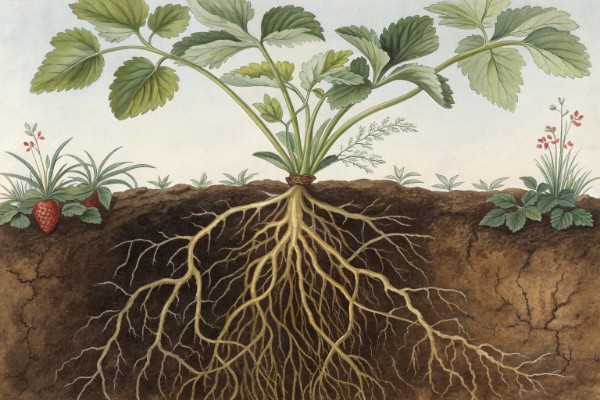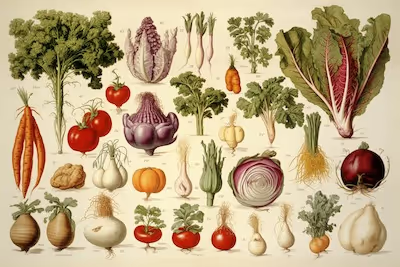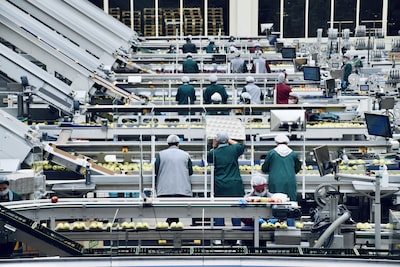Summer Vegetables to Grow for a Healthy, Productive Garden
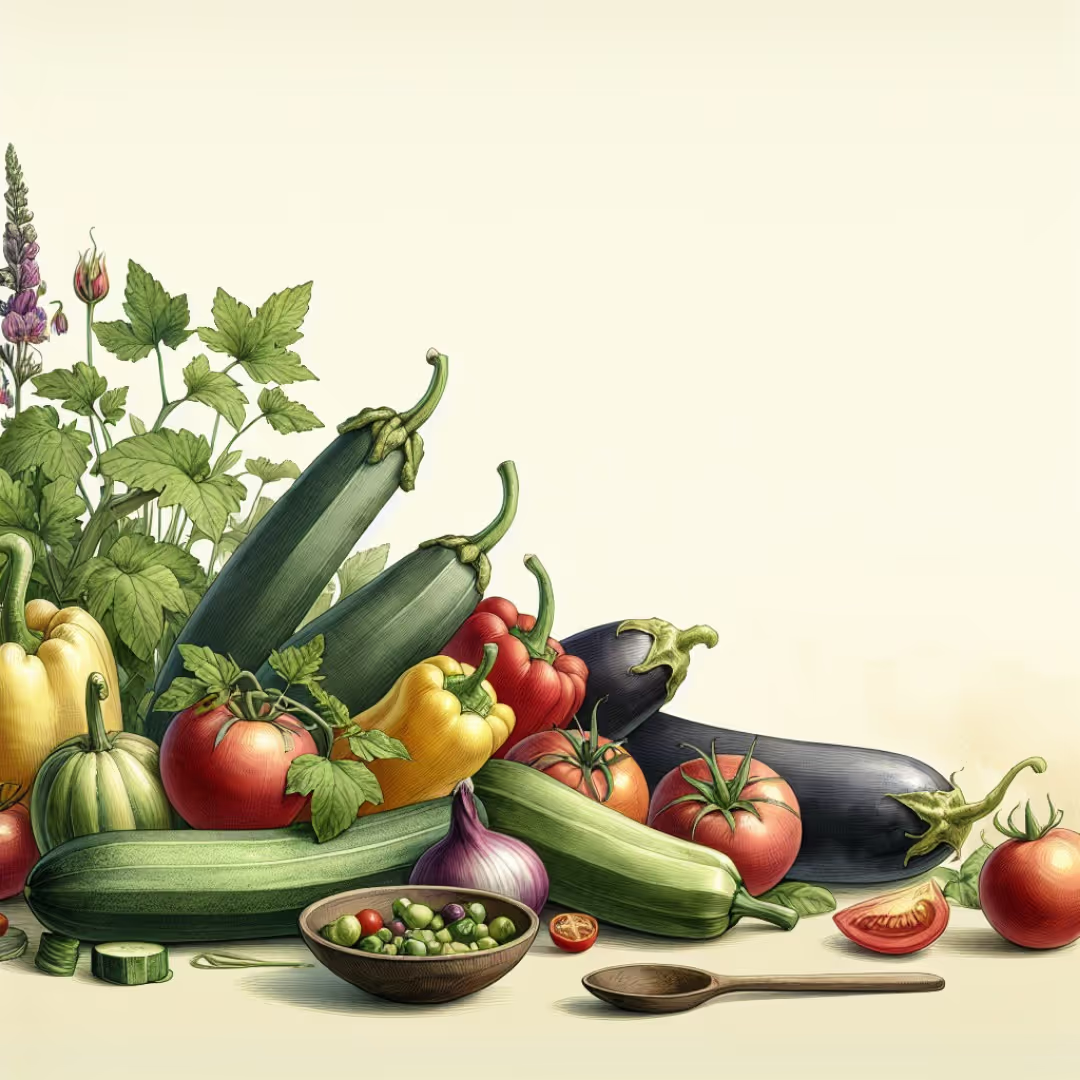
Summer vegetables to grow
Planting summer vegetables to grow revives your garden beds and rewards you with fresh bounty. Choose zucchini for its readiness to flourish, tomatoes that soak up summer sun, and cucumbers ideal for crisp salads. These veggies thrive in heat, promising delicious harvests all season—read on for varieties and tips to keep them vibrant and flavorful.
Cheatsheet: Grow Nutritious Summer Veggies Now
🌞 Top Performers for Summer
- Tomatoes – Lycopene-rich; productive in 70–95°F (21–35°C)
- Peppers – Vitamin C boost; thrive at 70–85°F (21–29°C)
- Eggplant – Fiber; loves heat, >75°F (>24°C)
- Green beans – Protein, iron; 65–85°F (18–29°C)
- Summer squash (zucchini) – Low-calorie, high-yield
- Cucumber – Hydrates, crisp harvests
- Okra – Calcium-rich; tolerates heat, >80°F (>27°C)
- Corn – Quick growth; needs direct sun
- Malabar spinach – Thrives in heat, iron & vitamin A
🥗 Health & Nutrition
- Tomatoes/peppers: boost immunity, reduce inflammation
- Greens: supply magnesium, folate
- 80% of gardeners report eating more veggies after growing their own
- Fresh-picked = maximum vitamins, zero transport emissions
⚡ Proven Steps for Success
- Choose sun: Pick a plot with 6–8 hr sun daily
- Prep soil: Mix in compost, ensure pH 6.0–7.0
- Direct sow or transplant: Seeds/starts after last frost, soil ≥65°F (18°C)
- Mulch thickly: Conserve water, suppress weeds
- Water early: 1–2" (2.5–5 cm)/week, deep not frequent
- Feed monthly: Balanced organic fertilizer
- Harvest often: Regular picking increases yield
🛠️ Tools and Products You'll Need
- High-quality seeds or transplants
- Hand trowel
- Garden gloves
- Mulch
- Watering can or drip hose
- Pruners
- Compost or organic fertilizer
- Stakes or cages (for tomatoes, beans)
🌱 Space Smart, Grow More
- Interplant quick crops (lettuce, radish) between slow growers
- Succession sow every 2–3 weeks for steady harvest
- Vertical trellis: For cucumbers, pole beans—save space, improve air flow
🍃 Maximize Self-Sufficiency
- Grow staples: tomatoes, beans, squash for months of meals
- Preserve extra: freeze, dry, or ferment for winter use
- Homegrown saves up to 60% of produce budget
I start warm-season planting only after the soil wakes up to 65 to 70 F, which is 18 to 21 C, at 8 a.m. depth. A 10 dollar soil thermometer has saved me more grief than any fancy gadget.
Tomatoes sulk when nights sit above 75 F, which is 24 C, and peppers drop blossoms over 90 F, which is 32 C. I lean on heat-tolerant cultivars and a strip of 30 percent shade cloth during hot spells.
“Most vegetables need at least 6 to 8 hours of full sun daily.” RHS
I warm spring beds with black plastic for two weeks, then mulch with straw to keep roots cool once heat arrives. The combo gives me early vigor and steadier yields in July and August.
- Tomatoes: I plant one indeterminate for season-long snacks and one determinate for big batches of sauce. For heat, I rely on ‘Heatmaster’, ‘Phoenix’, ‘Florida 91’, ‘Sungold’ F1, and ‘Juliet’, and I prune indeterminates to one or two leaders for airflow.
- Fruit set and care: Day temps above 90 to 95 F, which is 32 to 35 C, and warm nights can make pollen go lazy. Keep moisture even, mulch deep, and feed light and regular to avoid blossom end rot from water stress.
- Peppers: Sweet types like ‘Carmen’ and ‘Jimmy Nardello’ stay productive for me in heat, and ‘Shishito’ never quits. I add 30 percent shade cloth during heat waves to cut sunscald and I pick at breaker stage for faster rebloom.
- Heat set and nutrition: Fruit set falls above 90 F, which is 32 C, so I water early morning and avoid heavy pruning during hot spells. New Mexico State University’s Chile Pepper program shaped my approach on heat set and picking frequency.
- Cucumbers: Trellised vines stay cleaner and pick easier. Parthenocarpic types like ‘Diva’, ‘H-19 Little Leaf’, and downy-mildew-tough ‘DMR 401’ give me reliable fruit in sticky weather.
- Flavor care: Bitterness creeps in with stress and irregular watering. I feed modestly and pick small and often, three to four times per week at peak.
- Summer squash and zucchini: I sow fresh rounds every 3 to 4 weeks to sidestep vine borer wipeouts. Moschata types like ‘Butternut’ and ‘Tromboncino’ shrug off borers for me in hot, humid summers.
- Pollination and protection: Male flowers show up first, so I hold my nerve. Early in the season I use row cover, then remove at bloom or hand-pollinate at breakfast with a soft brush.
- Eggplant: ‘Ping Tung Long’ and ‘Black Beauty’ have never failed me in sultry weather. Flea beetles hate reflective mulch and a light oil spray timed at dusk.
- Beans: ‘Provider’ for the first flush, ‘Blue Lake’ for volume, ‘Fortex’ for those long, tender pods. Pole beans repay a sturdy trellis with weeks of harvests and easier picking.
- Soil biology: I inoculate seed with Rhizobium, then keep nitrogen modest so plants flower hard instead of going leafy. That shift shows up in the bowl and the freezer.
- Sweet corn: I plant in blocks, four rows wide, for good pollen coverage. Supersweets need isolation by time or space, and I water deeply at tassel and silk for filled ears.
- Harvest timing: I pick at milk stage and sprint to the pot. Sugar converts to starch fast once picked, which every old-timer reminds me of for good reason.
- Okra: Heat flips the turbo button for ‘Clemson Spineless’, ‘Jambalaya’, and ‘Nombo’. I harvest pods at 3 to 4 inches, which is 7 to 10 cm, and the plants reward me daily.
- Melons: For muskmelon I wait for full slip, and for watermelon I watch the nearest tendril to the fruit dry and the ground spot turn buttery. ‘Ambrosia’, ‘Sugar Baby’, ‘Crimson Sweet’, and ‘Charleston Gray’ earn bed space here.
- Sweetness trick: I taper irrigation during the last week before harvest on well-fed vines. Fruit sugars jump and texture tightens, as University of Illinois Extension also teaches.
- Tomatillos and ground cherries: I always plant two tomatillos for pollination and steady salsa verde. Ground cherries self-sow here and politely fill gaps with dessert-ready snacks.
- Heatproof greens: Malabar spinach climbs a trellis and stays tender with water discipline. Amaranth greens cut-and-come-again keep salads bright while lettuces bolt.
- Sweet potatoes: I set slips on raised ridges, then let vines carpet and shade their own soil. Cure roots at about 85 F, which is 29 C, and 85 percent relative humidity for 7 to 10 days for that custardy sweetness.
I side-dress heavy feeders with 0.5 cup per plant of a balanced organic, then spoon-feed with compost tea or a light soluble every 10 to 14 days. Overfeeding nitrogen always buys me lush vines and fewer fruits, so I resist the urge.
Vegetables need about 1 to 2 inches of water per week, which is 25 to 50 mm, split into deep irrigations. Mulch 2 to 4 inches, which is 5 to 10 cm, keeps roots steady and weeds sleepy.
“Drip irrigation can reduce water use by 30 to 60 percent compared with traditional methods.” FAO
Thirty percent shade cloth over tomatoes and peppers drops leaf temps and cuts sunscald. White cloth reflects heat better than black in my tests, and spring clamps make setup quick.
Kaolin clay film on fruit sets a protective chalk coat during the hottest weeks. I spray early morning and rinse fruit at harvest for that clean, market look.
- Scout hard, act soft: I walk with a hand lens twice a week and set sticky cards on trellises. Small problems stay small when I find them early.
- Time matters: Bt on young caterpillars and spinosad at dusk spare the bees. I skip sprays entirely when cucurbits are in peak bloom and use row cover earlier instead.
- SVD and borers: I deploy pheromone lures for squash vine borer in late spring. If pressure spikes, I plant more C. moschata and yank tired plants rather than chase ghosts in August.
- Disease resistance pays: V, F, N, TSWV, and DM on seed packets guide my choices in sticky summers. Resistant genetics keep plants alive while I fix airflow and watering.
“Resistant varieties are the most effective management tool for many vegetable diseases.” University of California Statewide IPM Program
I topdress with one-half inch of compost, which is about 1.3 cm, after each heavy harvest, then pull mulch back in place. Roots keep cool and biology keeps humming.
Between successions I solarize beds for 4 to 6 weeks using clear plastic during peak heat. UC ANR documents soil temps of 110 to 125 F, which is 43 to 52 C, at depth that suppress some pathogens and weed seeds.
- Beans and cucumbers every 2 to 3 weeks keep the crisper loaded without gluts. I stagger early, mid, and late tomato maturities for a steady stream of fruit.
- Basil, scallions, and dwarf marigolds under tomatoes act like living mulch. They shade soil and pull double duty in the kitchen.
- Dill, coriander, and sweet alyssum on bed edges lure hoverflies and lacewings. Fewer aphids, fewer sprays, calmer gardener.
- Tomato: ‘Heatmaster’, ‘Phoenix’, ‘Florida 91’, ‘Sungold’ F1, ‘Juliet’. Look for disease codes V, F, N, TSWV on tags.
- Cucumber: ‘DMR 401’, ‘Marketmore 76’, ‘Diva’, ‘H-19 Little Leaf’. Parthenocarpic types play well under netting.
- Squash: ‘Tromboncino’, ‘Butternut’, and steady zucchinis like ‘Costata Romanesco’. Plant fresh rounds to outrun pests.
- Pepper: ‘Carmen’, ‘Jimmy Nardello’, ‘Shishito’, ‘Poblano’, ‘Anaheim’. Pick often to keep plants setting.
- Okra: ‘Clemson Spineless’, ‘Jambalaya’, ‘Nombo’. Heat and water make the difference.
- Beans: ‘Provider’, ‘Blue Lake’, ‘Fortex’. Trellis poles for clean, long harvest windows.
- Melons: ‘Ambrosia’ muskmelon, ‘Sugar Baby’ and ‘Crimson Sweet’ watermelon, ‘Charleston Gray’ for droughty weeks. Thin fruits for quality over quantity.
- Sweet potato: ‘Beauregard’, ‘Covington’, ‘Murasaki’. Order slips early from a reputable grower for disease-free starts.
- Drip with 0.5 gph emitters at 12 inch spacing, pressure regulated near 10 psi, and a 150 mesh filter. The uniformity shows up in straighter cucumbers and fewer splits.
- Shade cloth at 30 to 40 percent with spring clamps and simple hoops spaced 4 feet, which is 1.2 m. Up in five minutes, plants happier by noon.
- A soil thermometer and a basic moisture meter beat guessing. For pH and nutrients, I mail a soil test to my state lab for about 15 to 25 USD.
- Cattle panels and T-posts build trellises that take wind. Zip ties and soft plant tape keep vines tidy and bruise free.
On tomatoes I run 0.75 inch twice weekly, which is about 19 mm each time, then shift to three lighter sets in sandy beds during heat spikes. I confirm with a trowel test to 6 inches, which is 15 cm, rather than trusting the surface.
Containers need more. A 15 gallon, which is 57 L, tomato usually drinks daily in July unless shaded in late afternoon.
- 4 by 8 ft bed: Two tomatoes on a panel, two peppers, one trellised cucumber, one zucchini, plus basil and scallions tucked in. Peak weeks bring 8 to 12 pounds of tomatoes, 10 to 15 cucumbers, and a steady bowl of squash.
- Patio plan: One 15 gallon tomato, one 10 gallon okra, two 5 gallon peppers, and a 5 gallon cucumber on a compact trellis. Potting mix ratio I like is 60 percent peat or coco, 30 percent compost, 10 percent perlite, then feed lightly with each watering.
- Blossom end rot: Irregular watering swings calcium inside the plant. Mulch and steady moisture beat calcium sprays every time, as extensions repeat for good reason.
- Sunscald: Keep a leaf umbrella over fruit. Use 30 percent shade cloth at midday and avoid hard pruning in heat.
- Bitter cucumbers: Pick smaller and keep moisture even. Choose non-bitter genetics for insurance.
- Squash no fruit: Early blooms are often male. Hand-pollinate in the morning and give it a week.
- Blossom drop in heat: At 95 F, which is 35 C, flowers fail. Add shade cloth, water early, and lean on heat-set varieties.
- USDA Plant Hardiness Zone Map for baseline climate planning.
- American Horticultural Society Heat Zone Map for heat stress days over 86 F, which is 30 C.
- FAO reports on irrigation efficiency and drip water savings.
- UC ANR and UC IPM on solarization, disease resistance, and cultural controls.
- University of Illinois Extension on melon ripeness and slip stage cues.
- New Mexico State University Chile Pepper Institute on fruit set temperature thresholds.
- North Carolina State Extension on sweet potato curing temperature and humidity.
- RHS and cooperative extensions for sun requirement, water guidance, and varietal notes.
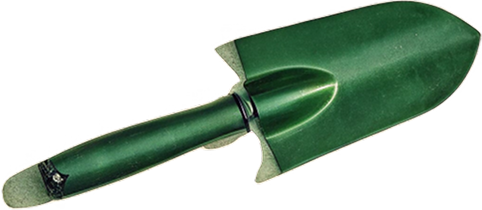
Want smarter plant choices? 🪴
Frequently Asked Questions About Growing Vegetables in Summer
What vegetables thrive best in hot summer conditions?
Vegetables that flourish under intense heat include tomatoes, peppers, eggplants, okra, zucchini, cucumbers, and green beans. These plants withstand higher temperatures, typically between 75°F–95°F (24°C–35°C), and grow vigorously in full sunlight.
How frequently should summer vegetables be watered?
Most vegetables grown during summer require consistent watering, usually one inch (2.5 cm) of water weekly. During very hot or dry periods, watering twice weekly supports steady growth. Water in the early morning or late afternoon to minimize evaporation and ensure moisture reaches deep into the soil.
Do summer vegetables need special fertilizers?
Fertilize summer-growing vegetables with a balanced, slow-release fertilizer before planting, then again midway through their growth cycle. A fertilizer ratio around 10-10-10 typically suits vegetable beds, promoting healthy foliage and abundant production.
How can gardeners protect summer vegetable plants from pests?
Regularly inspect plants and promptly remove affected leaves or pests manually. Introduce natural predators like ladybugs and lacewings to help control harmful insects. Applying organic solutions such as neem oil and insecticidal soap minimizes pest infestations safely and effectively.
When should summer vegetables be harvested?
Harvest vegetables regularly to encourage continuous production. Pick zucchini and cucumbers while they remain small and tender; gather tomatoes when vibrant and slightly soft; peppers can be picked at different stages, from green through full ripeness, depending on flavor preference.
How can soil moisture be maintained during hot weather?
Maintain steady soil moisture by adding a layer of organic mulch, such as straw, grass clippings, or compost. Mulch conserves moisture, lowers soil temperature, suppresses weeds, and gradually enriches the soil as it decomposes.
Healthy summer harvests start with the right picks, strong roots, and steady care. Choose tomatoes, peppers, cucumbers, squash, and beans for full sun vegetables. Feed the soil, water deep, lay mulch, and set sturdy trellises. Practice companion planting, welcome pollinators, and stay ahead of bugs with smart pest management. Keep greens from bolting with these tips to avoid early bolting. Light, regular fertilizing pays off.
Plan succession planting, harvest on time, and replant gaps so beds never sit idle. That is the heart of Summer vegetables to grow: simple moves, done consistently, that taste like July on a plate.
The Prepper's Guide to Essential Summer Vegetable Cultivation
Select Nutrient-Dense, Calorie-Rich Varieties
- Sweet Potatoes: High-calorie crop (86 kcal per 100g), stores 6 months plus in cool conditions of 55-60°F (13-16°C).
- Winter Squash (Butternut, Hubbard): Rich in vitamin A and calories (45 kcal per 100g); stores whole for 4-6 months.
- Dry Beans (Kidney, Pinto, Black Beans): Protein powerhouse; harvested dry, shelve for years in airtight containers.
Water-Wise Gardening Techniques
Drip irrigation systems: Reduce water use by 40-60%, target roots directly.
Ollas (buried clay pots): Ancient method that waters crops through porous clay, saving 50-70% water compared with overhead methods.
Preserving Nutritional Quality Through Summer Harvest
- Dehydration: Extend shelf life of summer harvest; sliced peppers, tomatoes, zucchini, and okra dried at 130-140°F (54-60°C), last up to a year.
- Canning: Preserve tomatoes as sauce, salsa, or whole in vinegar or water bath preservation techniques.
- Fermentation: Cucumbers to pickles; cabbage to sauerkraut—natural probiotic source, enhances food digestibility.
Seed Saving to Build Plant Resilience
Harvest seeds from heirloom summer vegetables like beans, tomatoes, peppers, and okra for replanting following year; adapt to regional conditions, reduce annual seed cost, and boost crop survivability.
Risk Mitigation Through Companion Planting
- Interplant basil near tomatoes—reduces hornworm damage.
- Marigolds between squash and cucumber—repel aphids, squash bugs, and nematodes.
Find out which plants will thrive in your garden!
Answer a few fun questions and get custom plant recommendations perfect for your space. Let’s grow something amazing together!

start your season

